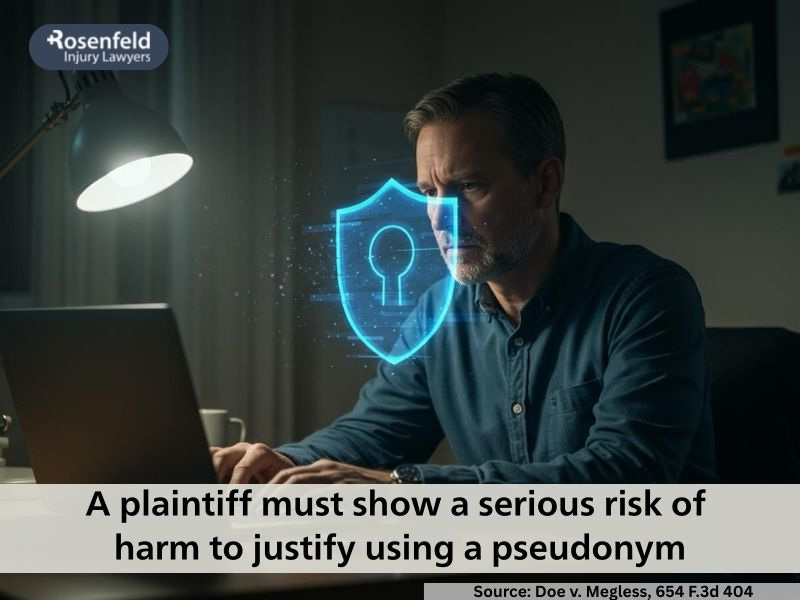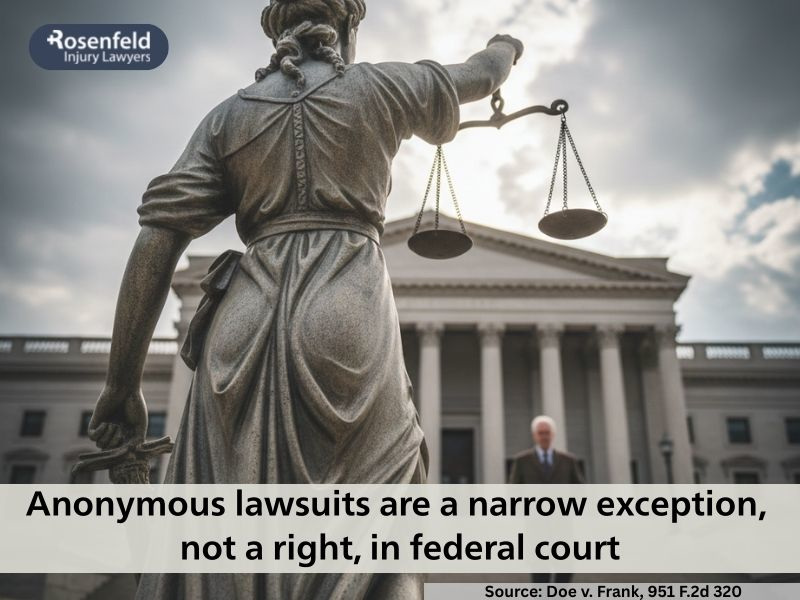Can You File a Lawsuit Anonymously?

Many of our clients wonder, “Can you file a lawsuit anonymously?” The short answer is that, while most court filings are part of the public record, there are limited circumstances where a plaintiff’s identity may be kept confidential through a court order.
Known as a John Doe lawsuit (or Jane Doe in cases involving women), this form of anonymous lawsuit allows a party seeking justice to press claims anonymously, protecting their identity while still pursuing their civil rights.
Courts recognize that some forms of litigation involve matters of a highly sensitive or purely legal nature, such as sexual assault, defamation, or emotional distress claims. However, anonymity is not automatic. Judges must weigh the public’s interest in open court proceedings against the potential harm that public disclosure might cause to the plaintiff or to innocent non-parties.
Does the Law Allow Suing Anonymously?
The question of whether you can file a lawsuit anonymously is governed by a general presumption in U.S. law that the plaintiff’s identity must be included in the complaint. Rule 10(a) of the Federal Rules of Civil Procedure requires that “the title of the complaint must name all the parties,” reinforcing that federal court proceedings are typically public and form part of the public record.
However, that rule is not absolute. Courts have recognized that, in certain circumstances, a party seeking to remain anonymous may do so through a court order, for example, filing under the pseudonyms John Doe or Jane Doe.
To determine whether anonymity is justified, a court-determined set of factors is applied, including:
- Whether the litigation involves matters that are highly sensitive or of a personal nature.
- Whether identification presents a risk of retaliatory harm or other harms to the plaintiff or non-accused parties.
- Whether the plaintiff is particularly vulnerable to harm from public disclosure.
- Whether the suit challenges actions of a government agency or private parties.
- Whether the defendant would be prejudiced by the anonymous lawsuit, and if that prejudice can be mitigated.
- Whether the plaintiff’s identity has remained confidential up to the time of filing.
- Whether the public’s interest in open access to court documents outweighs the personal nature of the claims.
- Whether the issues presented are of a purely legal nature, with an atypically weak public interest in knowing the litigants’ identities.
- Whether there are alternative mechanisms for protecting confidentiality without concealing the party’s identity entirely.
In other words, while there is a presumption in favor of public access and transparency, federal courts have discretion to make exceptions on a case-by-case basis when identification imposes a genuine risk of harm or when the issues presented are purely legal rather than factual or personal.

When Can a Lawsuit Be Brought Anonymously?
A lawsuit may be brought anonymously only when the court determines that the plaintiff’s interest in confidentiality outweighs the public’s interest in transparency.
Such limited circumstances often involve:
- Minors, where revealing the child’s identity could endanger their safety or violate privacy protections.
- Sexual assault, abuse, or harassment cases where public identification would risk retraumatizing the victim or discourage others from reporting misconduct.
- Defamation, deliberate infliction of emotional distress, or other personal claims where disclosure of identity would amplify harm.
- Whistleblower or retaliation cases involving potential threats to the plaintiff’s career, safety, or livelihood.
- Cases involving purely legal disputes or an atypically weak public interest in disclosure, such as when the law itself, not the facts about the parties, is at issue.
Even in these scenarios, anonymity is not guaranteed. Courts must still ensure fairness to all participating parties, including the defendant and the opposing party, and confirm that justice can be served without undermining the public’s confidence in open judicial proceedings.
The decision ultimately rests with the district court, which determines on an individual basis whether to issue an order allowing the plaintiff to proceed anonymously.
Common Grounds for a John Doe Lawsuit
When a plaintiff seeks to file suit anonymously, courts often refer to it as a John Doe or Jane Doe filing. These cases are typically permitted only when identification presents a serious risk of harm.
Common examples include:
- Minors bringing civil claims through a parent or guardian, where confidentiality protects their safety and privacy.
- Sexual assault or abuse victims seeking to avoid further trauma and stigma by keeping their identity confidential.
- Defamation claims involving intimate or stigmatizing allegations, such as medical conditions or sexual conduct, where revealing the plaintiff’s name could intensify harm or invite anonymous poster retaliation online.
- Whistleblower or retaliation lawsuits, where a plaintiff exposes misconduct and fears retribution from an employer, government body, or private parties.
- Cases of intentional infliction of emotional distress, mental health, or other disputes where the lawsuit involves matters of a highly personal or sensitive nature.
In all of these circumstances, courts must balance the plaintiff’s right to anonymity with the public’s right of access to court records and proceedings. While it is possible to sue or press claims anonymously, the right to do so is narrowly construed, reflecting the judiciary’s ongoing commitment to both confidentiality and transparency in the pursuit of justice.
For many individuals, anonymity offers a way to seek relief without exposing personal trauma or reputational harm. Yet every person seeking to file a case anonymously must still meet the strict legal standard requiring plaintiffs to show a legitimate need for privacy.
FAQs
Can defendants remain anonymous in court proceedings?
No. Defendants cannot remain anonymous in most court proceedings. The law requires that all parties to a lawsuit be named so the opposing party can respond to the claims. While certain court files can later be sealed to protect innocent non-parties or sensitive information, the defendant’s identity must appear in the initial complaint.
Can I file anonymously for health and disability benefits?
No. Filing for health or disability benefits is not considered an anonymous lawsuit. These claims require verification of medical and employment records, so the agency or insurer must know the applicant’s identity. There are no available remedies for an anonymous review of disability-benefit applications.
Are anonymous lawsuits public records?
Yes. Even anonymous lawsuits are generally part of the public record. While a court may allow the plaintiff to proceed anonymously under a pseudonym such as Jane or Joe Doe, the case filings, court orders, and litigation documents remain accessible to the public in most states. Only names and identifying information may be redacted or sealed by court order.
Contact Us to Understand Your Legal Rights
If you are considering whether you can file a lawsuit anonymously, our team is here to help. We understand that some cases involve deeply personal and sensitive matters, from sexual assault and emotional distress to privacy-related claims where public disclosure could cause further harm.
Our attorneys guide clients through every step of the process, explaining when confidentiality may be granted and how to protect their rights while pursuing justice. We handle all filings, evaluate whether your situation qualifies for anonymous proceedings, and work to ensure that your identity and privacy remain protected wherever possible.
We offer a free, confidential consultation to discuss your potential claim and determine the best way to proceed. There are no upfront costs, because we work on a contingency fee basis, meaning you pay nothing unless we recover compensation for you.
If you’re facing a sensitive legal situation and need to understand your options, contact Injury Lawyer Team today to speak with an experienced attorney who will listen, guide, and stand with you every step of the way.
All content undergoes thorough legal review by experienced attorneys, including Jonathan Rosenfeld. With 25 years of experience in personal injury law and over 100 years of combined legal expertise within our team, we ensure that every article is legally accurate, compliant, and reflects current legal standards.








